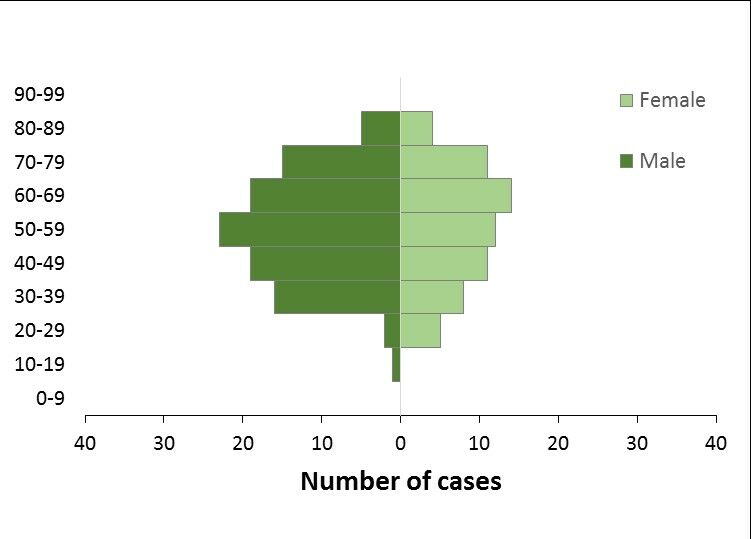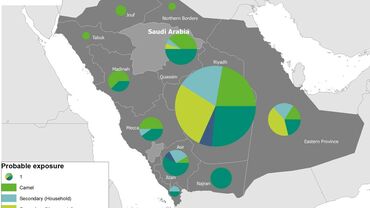Epidemiological update: Middle East respiratory syndrome coronavirus (MERS-CoV)
Since the last epidemiological update on 15 June 2015, 25 additional cases and seven deaths in previously reported cases have been reported in South Korea. Health authorities in Thailand reported their first MERS-CoV case.
On 16 June 2015 Germany reported the death of a previously reported case. The person died on 6 June.
On 18 June 2015, the health authorities in Thailand reported their first MERS-CoV case. Media report that the person travelled to Thailand from Oman.
Since the last epidemiological update on 15 June 2015, 25 additional cases and seven deaths in previously reported cases have been reported in South Korea. As of 18 June, the total number of cases in South Korea is 164, including 23 deaths.
Since the last update on 11 June 2015, Saudi Arabia has reported seven additional cases and seven deaths in previously reported cases.
On 16 June 2015, WHO reported an additional case in the United Arab Emirates in a non-national.
World Health Organization ninth meeting of the IHR Emergency Committee
On 16 June 2015, WHO convened the ninth meeting of the IHR Emergency Committee on MERS-CoV in regards to the current outbreak in South Korea.
The Committee noted the assessment of the Joint mission to South Korea and that the main factors contributing to the spread of MERS-CoV were:
- lack of awareness among healthcare workers and the general public about MERS;
- suboptimal infection prevention and control measures in hospitals;
- close and prolonged contact of infected MERS patients in crowded emergency rooms and multibed rooms in hospitals;
- the practice of seeking care at multiple hospitals ("doctor shopping");
- the custom of many visitors or family members staying with infected patients in the hospital rooms facilitating secondary spread of infections among contacts.
The Committee noted that available evidence on genetic sequencing did not identify any significant changes in the viruses obtained from cases in South Korea compared to viruses from the Middle East. Ongoing monitoring of potential genetic changes in these viruses is important. In this outbreak, transmission of MERS-CoV has been strongly associated with healthcare settings. This aspect stresses the need for health authorities to make every possible effort to ensure that effective infection prevention and control measures are in place at all times.
The Committee concluded that the conditions for a Public Health Emergency of International Concern have not been met.
Event background information
Since April 2012 and as of 18 June 2015, 1 354 cases of MERS-CoV (including 520 deaths) have been reported by health authorities worldwide.
Distribution of confirmed cases of MERS-CoV by month and probable place of infection, March 2012 – 18 June 2015 (n=1 354)
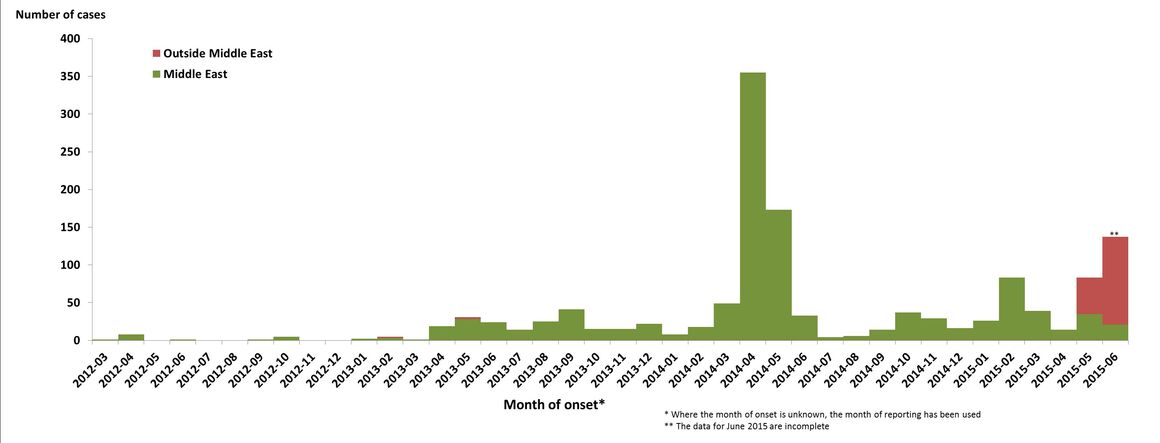
Geographical distribution
Most of the cases have occurred in the Middle East: Saudi Arabia, United Arab Emirates, Qatar, Jordan, Oman, Kuwait, Egypt, Yemen, Lebanon and Iran.
|
Reporting country |
Cases |
Deaths |
|---|---|---|
|
Middle East |
1163 |
486 |
|
Saudi Arabia |
1 035 |
458 |
|
United Arab Emirates |
78 |
10 |
|
Qatar |
13 |
5 |
|
Jordan |
19 |
6 |
|
Oman |
6 |
3 |
|
Kuwait |
3 |
1 |
|
Egypt |
1 |
0 |
|
Yemen |
1 |
1 |
|
Lebanon |
1 |
0 |
|
Iran |
6 |
2 |
|
Europe
|
15 |
8 |
|
Turkey |
1 |
1 |
|
Austria |
1 |
0 |
|
United Kingdom |
4 |
3 |
|
Germany |
3 |
2 |
|
France |
2 |
1 |
|
Italy |
1 |
0 |
|
Greece |
1 |
1 |
|
Netherlands |
2 |
0 |
|
Rest of the world
|
176 |
26 |
|
Tunisia |
3 |
1 |
|
Algeria |
2 |
1 |
|
Malaysia |
1 |
1 |
|
Philippines |
2 |
0 |
|
South Korea |
164 |
23 |
|
China |
1 |
0 |
|
Thailand |
1 |
0 |
|
United States of America
|
2
|
0
|
|
Total |
1 354 |
520 |
All cases reported from outside the Middle East have a recent travel history to the Middle East or are linked to a case with a travel history to the Middle East.
Distribution of confirmed MERS-CoV cases by place of probable infection, as of 18 June 2015 (n=1 354)
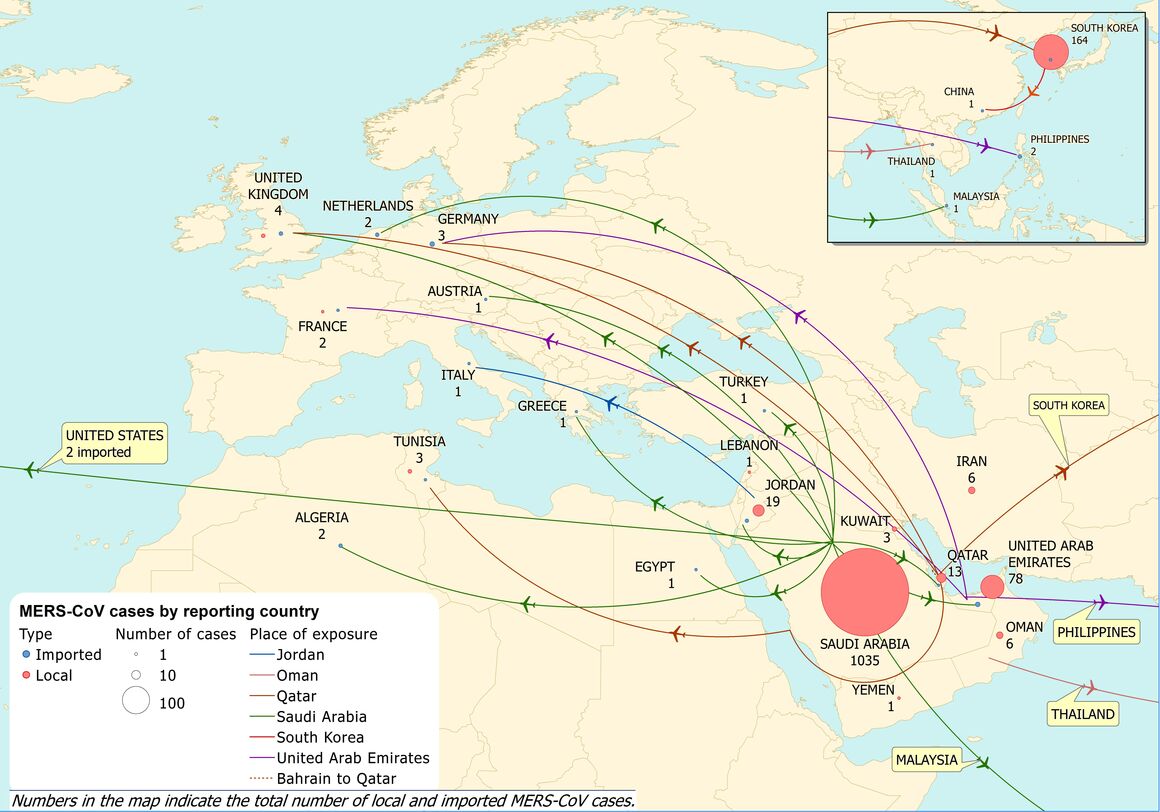
Germany
On 16 June 2015, Germany reported the death of a previously reported case. The 65-year-old , who travelled to United Arab Emirates earlier this year, died in Germany on 6 June due to lung disease.
Saudi Arabia
Since the last update on 11 June 2015, Saudi Arabia reported seven additional cases and seven deaths in previously reported cases. All of the cases are reported from Hofuf, except one from Riyadh. One of the seven additional cases is a healthcare worker.
United Arab Emirates
On 16 June 2015, WHO reported an additional case in a 65-year-old non-national male from the Eastern region. He developed symptoms on 31 May and was admitted to hospital on 6 June. The patient, who has comorbidities, tested positive for MERS-CoV on 14 June. He has no history of exposure to known risk factors in the 14 days prior to onset of symptoms. Currently, the patient is in critical condition in an intensive care unit. Tracing of household and healthcare contacts is ongoing.
Thailand
On 18 June 2015, the health authorities in Thailand reported the first case of MERS-CoV in a 77-year-old Middle Eastern man who travelled there to visit a private healthcare facility . According to the media quoting the Public Health Minister, the man comes from Oman. The local health authorities report having taken the necessary measures according to WHO guidelines.
South Korea - China
On 20 May 2015, the South Korean Centres for Disease Control and Prevention reported a case of MERS-CoV in a 68-year-old man, with recent travel history to the Middle East. The patient has no history of exposure to known risk factors in the 14 days prior to detection. Investigation of the source of infection is ongoing[1].
Since the last epidemiological update published by ECDC on 15 June 2015, 25 additional cases and seven deaths in previously reported cases have been reported by South Korean authorities. As of 18 June, the number of cases reported in South Korea is 164, including 23 deaths. One non-fatal case has been reported in China.
The case in China is the son of a patient admitted in South Korea who travelled to Hong Kong, Guangdong province, China, on 26 May 2015. He was admitted and isolated in a hospital in Hong Kong on 27 May 2015. This patient was confirmed positive for MERS-CoV infection on 29 May[2].
For the 165 cases reported in South Korea and China, the onset dates range from 11 May for the index case, to 18 June for the most recent cases, according to WHO. The sex distribution for the 165 cases is 100 males and 65 females (M/F sex ratio of 1.5, figure 2) and the median age is 56 years, ranging from 16 to 87 years. Of the 165 cases, 23 have died and 24 have recovered and been discharged from the hospital. Of the remaining 118 patients, 101 are in a stable condition and 17 are in a critical condition, according to the South Korean health authorities.
Among the 23 reported deaths, the median age was 68 years, ranging from 49 to 83 years. Twenty-on (91 %) of the 23 fatal cases were elderly, immunocompromised, or suffering from pre-existing conditions such as COPD, cancer, cerebrovascular disease and diabetes.
All cases reported in South Korea and China are linked to healthcare facilities and were either patients (47%), visitors (35%) or healthcare workers (18%). No community-acquired MERS-CoV infection has been reported. According to the Korean Centre for Disease Prevention and Control, 16 medical facilities reported confirmed cases in South Korea.
Distribution of confirmed cases of MERS-CoV by date of onset* and hospital of admission, 11 May–18 June 2015, South Korea and China (n=165)
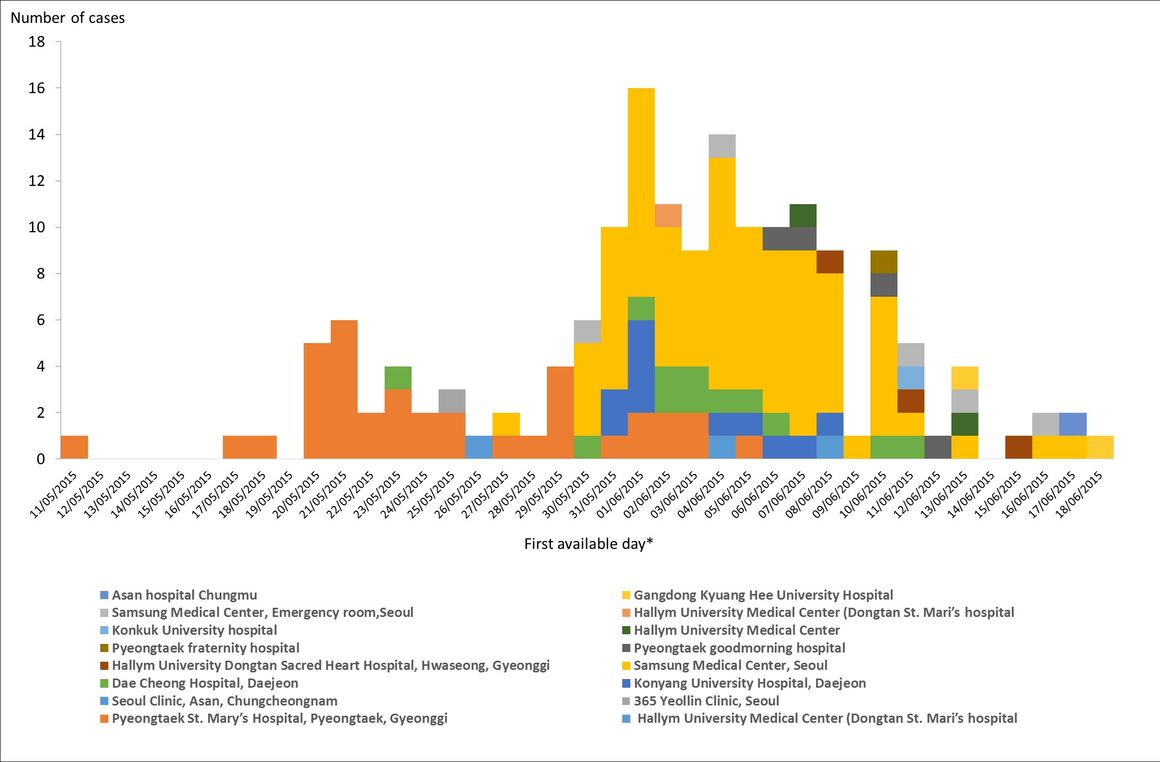
* If the date of onset is unknown, date of reporting has been used.
Distribution of confirmed cases of MERS-CoV by hospital, 11 May–18 June 2015, South Korea and China (n=165)
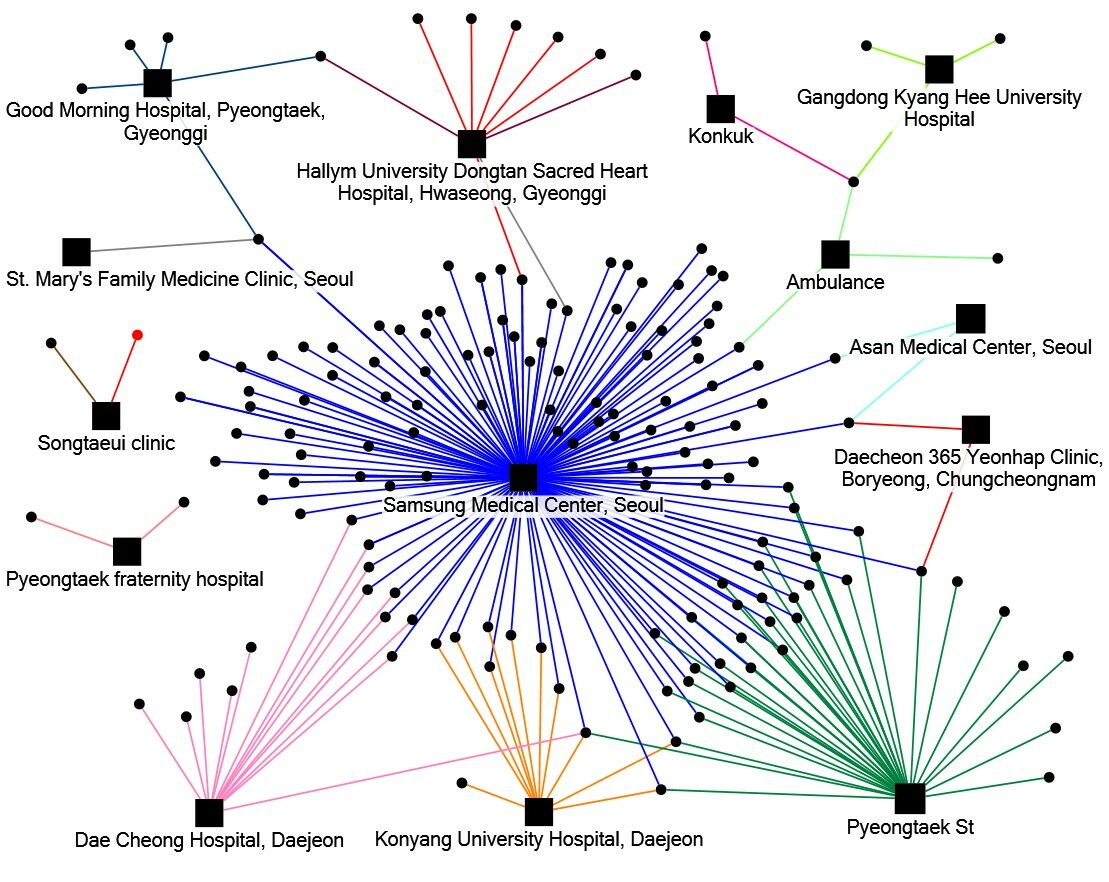
Distribution of confirmed cases of MERS-CoV by age and gender, 11 May–18 June 2015, South Korea and China (n=165)
